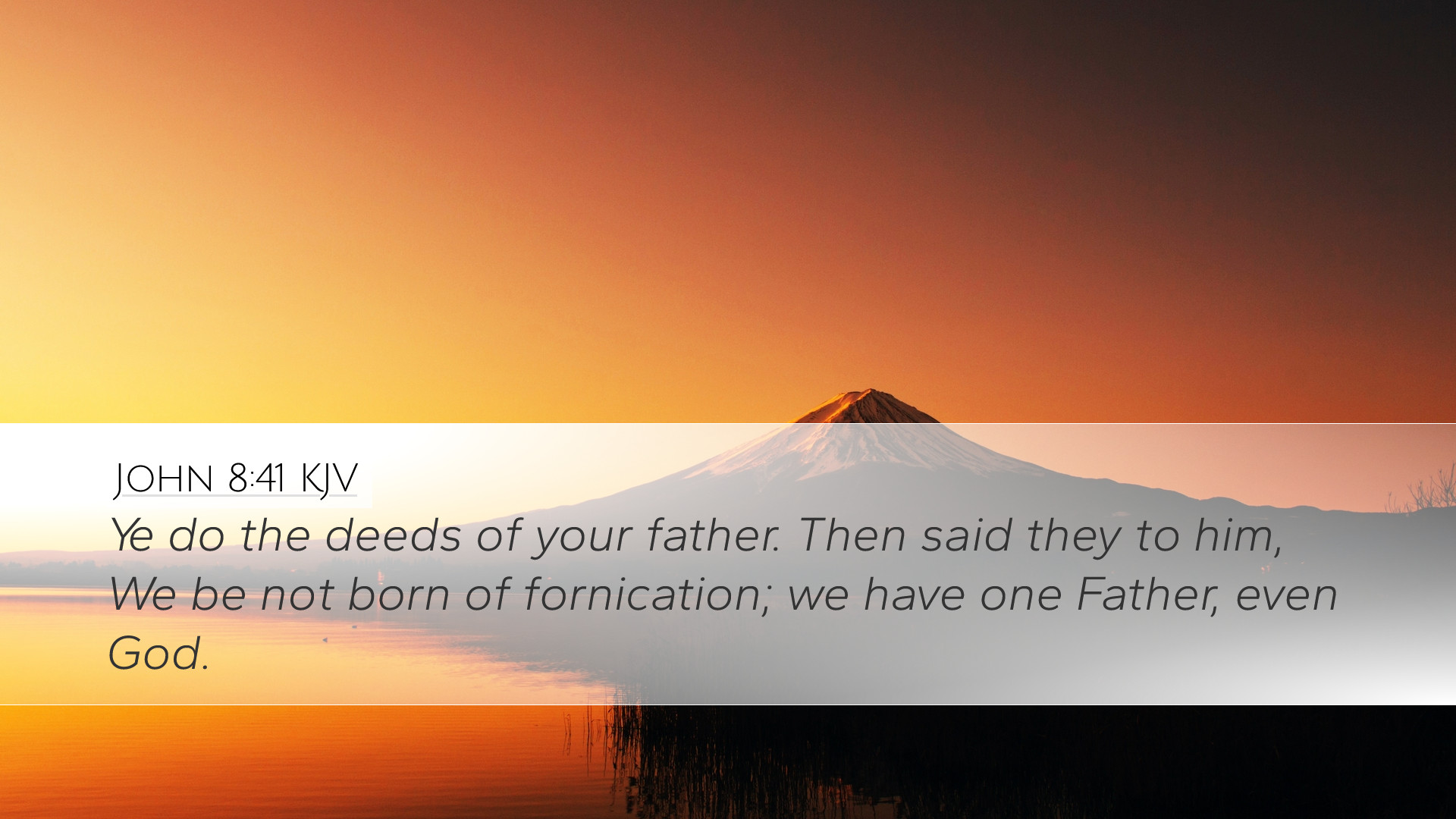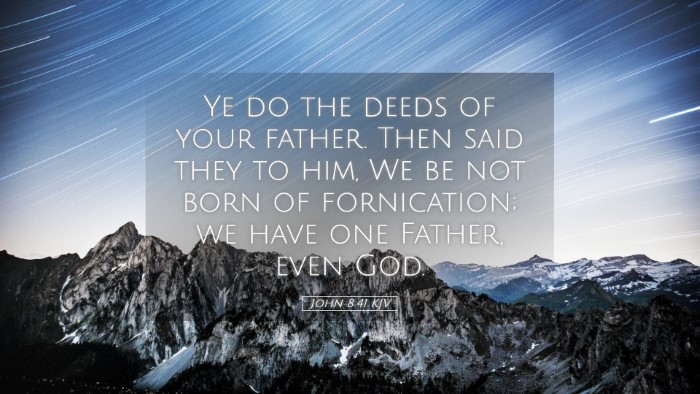Commentary on John 8:41
Verse Reference: John 8:41 - "Ye do the deeds of your father. Then said they to him, We be not born of fornication; we have one Father, even God."
Introduction
John 8:41 presents a significant moment in the dialogue between Jesus and the Jewish leaders. This verse not only reveals the tension between the two parties but also initiates a discussion of spiritual lineage and authenticity. In this commentary, insights from public domain sources such as Matthew Henry, Albert Barnes, and Adam Clarke will be explored to enrich understanding of this passage.
The Context of the Verses
The context of John 8 involves a confrontation during the Feast of Tabernacles. Jesus has been teaching in the Temple, proclaiming Himself as the Light of the world (John 8:12). The accusations and rebuttals between Jesus and the Pharisees become increasingly heated, culminating in deeper revelations about identity and paternity—both physical and spiritual.
Understanding the Accusation
In John 8:41, the Jewish leaders respond to Jesus’ assertion about the nature of their works. They assert their lineage while trying to delegitimize Jesus’ claims by indicating a supposed illegitimacy in His origins. This line of reasoning is examined by various commentators:
-
Matthew Henry:
Henry explains that the leaders' statement "We be not born of fornication" indicates their attempt to assert their purity and esteemed lineage versus the implication of Jesus’ questionable birth (notably, the virgin birth scandal). Their pride blinds them to the deeper spiritual truths with which Jesus aligns them.
-
Albert Barnes:
Barnes argues that the phrase reflects a common idea of Jewish identity—that their birthright and covenant with God through Abraham ensures their standing. Their attempt to claim God as their only Father reveals a misunderstanding of true spiritual descent, which extends beyond mere ethnic or physical lineage.
-
Adam Clarke:
Clarke emphasizes the undercurrents of accusation and defense in this discourse. He points out the irony in their claim as it relates to the spiritual fatherhood that Jesus will elucidate. Their reliance on their history distracts them from recognizing the truths Jesus is revealing about their moral and spiritual standing.
Spiritual Fatherhood and Deeds
Jesus' declaration about doing the “deeds of your father” implies a deeper understanding of identity than biological descent. The implications of spiritual paternity must be carefully unpacked:
-
Theological Implication:
The notion of "father" here extends to spiritual allegiance. Both Henry and Barnes argue that Jesus is preparing to reveal the true nature of their father, which is not God but rather the devil, due to their actions against Him. This concept challenges contemporary readers to examine their own spiritual allegiances.
-
Ethical Consideration:
The grappling with the dichotomy of spiritual versus physical ancestry urges a moral reflection. One does not become a child of God simply through heritage; one's deeds reflect their true spiritual lineage. Such a discourse is critical for students of theology examining the implications of faith, works, and identity in Christ.
The Nature of Spiritual Claims
The response of the Jews also showcases a significant barrier to Christ’s message. Their emphasis on their status as children of God suggests a comfort in heritage and entitlement. Here, practical insights emerge:
-
Henry’s Reflection:
Henry points out that having God as Father comes with responsibilities and expectations. The pride expressed by the Jewish leaders serves as a caution to modern believers about resting in assumed grace rather than producing fruit consistent with their confession.
-
Barnes’ Exposition:
Barnes highlights that the passage exposes the misconception of assuming a relationship with God based solely on heritage. This fundamental truth resonates throughout the New Testament and is vital for pastors addressing communities grounded in tradition while needing renewal in faith.
Conclusion
John 8:41 dramatically highlights the interplay between identity, heritage, and action. The accusations reveal a deeper spiritual truth—one’s spiritual father is not determined by blood but by belief and behavior. As pastors, students, and scholars engage with this text, it is imperative to discern the contemporary implications of spiritual lineage, urging a re-examination of what it means to be a true child of God. These insights, gleaned from the commentaries of Henry, Barnes, and Clarke, encourage a deeper reflection on our spiritual identities and the deeds that testify to them.


